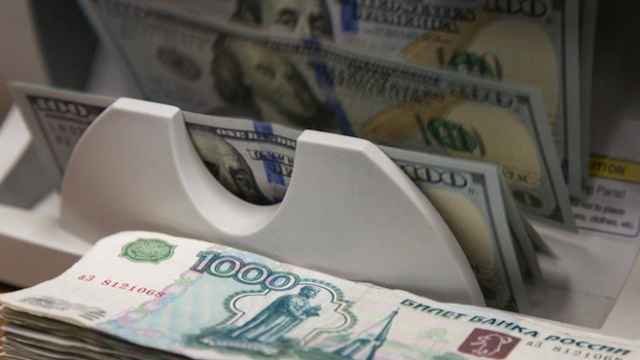Russian assets fell on Monday, with the ruble hitting a fresh record low against the dollar after Europe and the United States accused Russia of direct military involvement in Ukraine.
Fears of new sanctions, which could include a ban on buying new Russian bonds, and weak economic data from China added to concerns.
At 1:40 p.m. GMT, the ruble was 0.2 percent weaker against the dollar at 37.19. It also lost 0.2 percent to 48.85 versus the euro and 0.2 percent to 42.44 against its dollar-euro basket.
Earlier in the day the ruble hit a new record low of 37.50 against the dollar, before rebounding in the afternoon.
"Geopolitical tensions this week are unlikely to allow the ruble to stabilize," said in a note Alexei Yegorov, an analyst at Promsvyazbank. "This means that the dollar may reach the level of 38 rubles this week."
Russian stocks fell as the weakening ruble dragged down the dollar-based RTS index. Data also showed that growth in China's vast factory sector, a major importer of Russia's raw materials, slackened in August.
The RTS was 0.6 percent down to 1,183 points, while its ruble-based MICEX lost 0.3 percent to 1,396 points.
Moscow indexes and the ruble had plunged last week and bond yields rose as the West accused Russia of deploying troops in Ukraine, and threatened new sanctions.
Yields Rising
Yields on Russia's Eurobonds rose by 30-50 basis points last week, with the benchmark Eurobond maturing in 2030 trading at 5.03 percent on Monday, up from 4.59 percent in the middle of last week. That is still significantly below the 12 percent level seen in the aftermath of the 2008 global crisis.
Ruble treasury bonds also saw their yields rising, by about 30-50 basis points in recent days, chiefly reacting to the weakening ruble. The yield on Russia's 2023 treasury was at 9.82 percent on Wednesday, up from 9.31 percent on Aug 27.
On Monday, sources said the European Union could bar Europeans from buying new Russian government bonds under a package of extra sanctions against Moscow.
There was no immediate reactions on the Russian bond market to the news, as markets have broadly priced in another wave of sanctions.
Overall trading activity on Russian markets on Monday was subdued, due to a holiday in the United States.
Russia is also in a comfortable fiscal position, with budget to see a small surplus this year thanks to the weaker ruble and higher-than-expected oil prices.
There is also nearly half a trillion dollars worth of gold and foreign exchange reserves that could be used to repair the country's finances if a need arises.
The Finance Ministry has cancelled a number of its weekly treasury bonds auctions, so-called OFZ bonds, this year because of unfavorable market conditions. The share of foreign investors in the OFZ market stood at 25 percent in July, according to data from the central bank.
"For ruble bonds (the possible EU ban) is effectively already all priced in, because in the last three months no inflow of funds has been visible from non-residents in this segment," said Alexander Baranov, deputy general director at Pallada Asset Management in Moscow.
"What's more, the price of OFZs has plummeted and the yield has risen as a result. Not long ago the longest bonds, expiring in 2027, were trading at the same yield as in the first half of 2009 — the highest level for the last five years."
But a possible ban could damage Russia's creditworthiness and have an impact on corporate borrowing as sovereign issues serve as a benchmark for bonds issued by companies and banks.
A Message from The Moscow Times:
Dear readers,
We are facing unprecedented challenges. Russia's Prosecutor General's Office has designated The Moscow Times as an "undesirable" organization, criminalizing our work and putting our staff at risk of prosecution. This follows our earlier unjust labeling as a "foreign agent."
These actions are direct attempts to silence independent journalism in Russia. The authorities claim our work "discredits the decisions of the Russian leadership." We see things differently: we strive to provide accurate, unbiased reporting on Russia.
We, the journalists of The Moscow Times, refuse to be silenced. But to continue our work, we need your help.
Your support, no matter how small, makes a world of difference. If you can, please support us monthly starting from just $2. It's quick to set up, and every contribution makes a significant impact.
By supporting The Moscow Times, you're defending open, independent journalism in the face of repression. Thank you for standing with us.
Remind me later.





